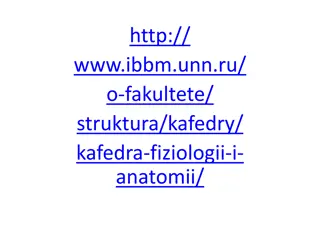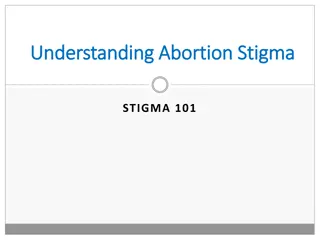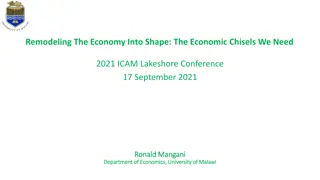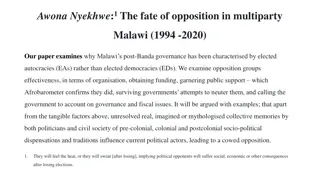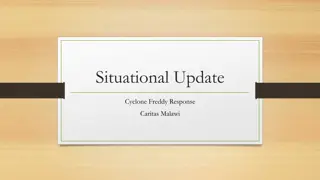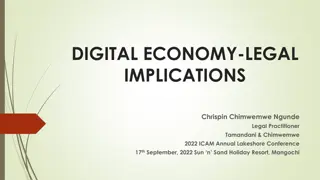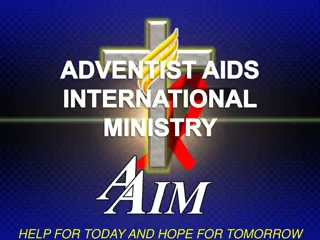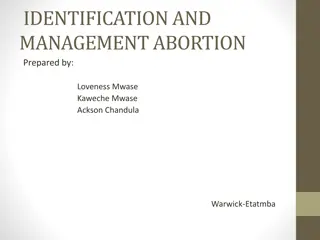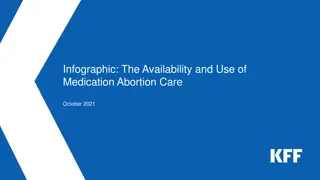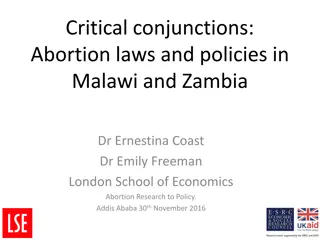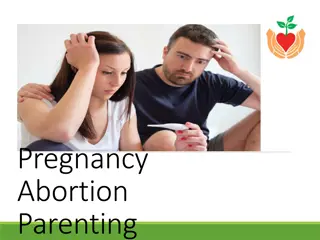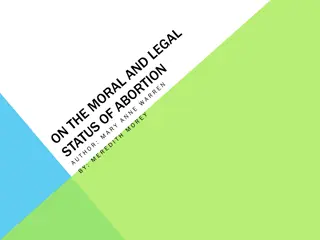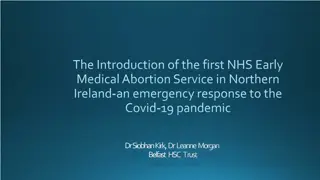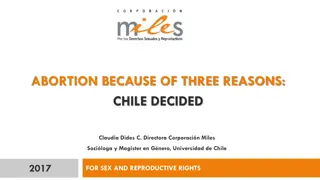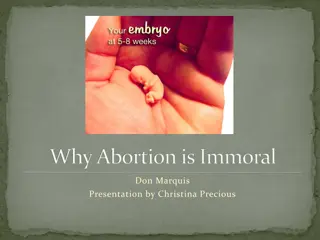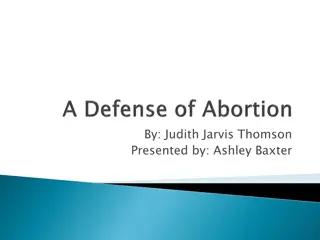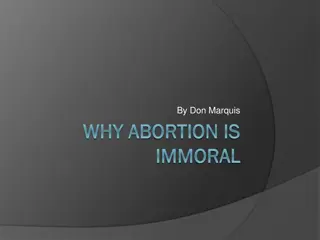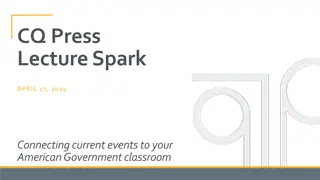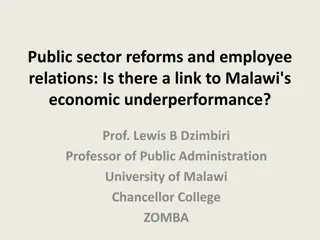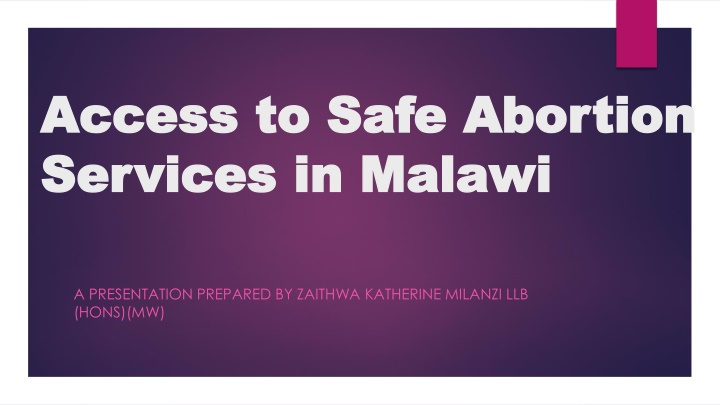
Access to Safe Abortion Services in Malawi: Economic Hurdles and Solutions
Explore the challenges young women face in accessing safe abortion services in Malawi, including economic barriers and solutions. Learn about the impact of climate disasters on access to reproductive healthcare. Key terms, definitions, and post-abortion care are also discussed.
Download Presentation

Please find below an Image/Link to download the presentation.
The content on the website is provided AS IS for your information and personal use only. It may not be sold, licensed, or shared on other websites without obtaining consent from the author. If you encounter any issues during the download, it is possible that the publisher has removed the file from their server.
You are allowed to download the files provided on this website for personal or commercial use, subject to the condition that they are used lawfully. All files are the property of their respective owners.
The content on the website is provided AS IS for your information and personal use only. It may not be sold, licensed, or shared on other websites without obtaining consent from the author.
E N D
Presentation Transcript
Access to Safe Abortion Access to Safe Abortion Services in Malawi Services in Malawi A PRESENTATION PREPARED BY ZAITHWA KATHERINE MILANZI LLB (HONS)(MW)
PRESENTATION OUTLINE Introduction Key Terms & definitions Economic hurdles for young women in accessing safe abortion services Solutions to Economic hurdles for young women in accessing safe abortion services Solutions to Access to safe abortion services during climate disasters Access to safe abortion services during climate disasters
INTRODUCTION Austerity measures come in the context of growing debt burdens and lack of external financial support Access to Sexual reproductive health rights (SRHR) has been and continues to be a challenge for many adolescent girls and young women(AGYW), especially those living in low and middle income countries, of which Malawi is one. The Government of Malawi increases its percentage spending in the health sector but in real terms, health sector spending remains low. At the same time, Malawi continues to experience negative effects of climate change. Cyclone Freddy made landfall in Malawi in March, 2023 brining with it torrential rains, mud slides and floods. 2,500,000 people were affected. Earlier this year, Malawi experienced localized flooding and droughts. Some countries are in a state of disaster.
KEY TERMS AND DEFINITIONS DEBT CRISIS A situation in which a country is unable to pay back its government debt. According to the IMF, the average debt ratio in Sub-Saharan Africa has almost doubled from 30% of GDP at the end of 2013 to almost 60% of GDP by end- 2022. This situation results in austerity, structural adjustment and fiscal consolidation. SEXUAL REPRODUCTIVE HEALTH RIGHTS (SRHR) The individual autonomy and the ability to make choices regarding individual s own reproduction and sexuality to enjoy the highest attainable standard of health. This also includes access to education and healthcare to freely decide who to have sex with; and knowledge and healthcare products to avoid STIs or unintended pregnancy.
KEY TERMS AND DEFINITIONS cont. ADOLESCENCE Adolescence is the period of life spanning between ages 10-19, when biological, physical, cognitive and social change occurs Young people are people aged between 15-35 years POST ABORTION CARE A set of interventions used to reduce injuries and deaths from incomplete and unsafe abortions and to address any complications that may arise. This includes i) treatment, ii)counselling, iii)contraceptive and family services, iv) reproductive and other services, v)community service provider partnerships.
AUSTERITY AND ACCESS TO SRHR - Austerity affects the resources that support girls and women s rights issues such as access to SRHR services. - Austerity also affects support for social services while privatization reduces government s focus on developing public sectors such as the health sector.
GENDER, AGE AND SRHR DISPARITIES Funding cuts for family planning services means less family planning commodities are accessible. For example, in the year 2020, the Ministry of Finance proposed that it would reduce its contribution to family planning commodities from the planned MK186 million to MK176 million. In Malawi, SRHR remains out of reach for many with unmet needs, especially adolescents and young unmarried women. The increasing disengagement of the State from responsibility for welfare of women and girls SRHR is detrimental to realization of SRHR for AGYW The effects of government s disengagement places a greater burden on AGYW, whose unpaid domestic work operate as a hurdle for access to remuneration to access privatized SRH services, especially in light of the employment poor AGYW have access to and the additional pressures placed on AGYW.
AUSTERITY AND SEXUAL STIGMATIZATION. There is multiple discrimination related to SRHR. By shifting responsibility for health care from the State to private individuals, sexually stigmatized people are blamed for health problems due to their irresponsible sexual behavior.
SOLUTIONS TO HURDLES FACED BY AGYW PROGRESSIVE TAXATION FEMINIST BUDGETING DEBT CANCELLATION
ACCESS TO SAFE ABORTION SERVICES DURING CLIMATE DISASTERS The newly enacted Disaster Management Act 2023 mandates the representation of marginalized groups such as people living with disabilities, in disaster risk management communities at local level. The Act however fails to include a representative of the Ministry of Gender in the Disaster Risk Management Committee. The Act also fails to mention access to SRHR. Overcrowding in camps and the unavailability of basic needs exposes affected populations to harmful coping mechanisms such as transactional sex. In times of disaster, women prioritize family planning and SRHR services but these interests compete with available resources, amidst shortage or unavailability of other essential goods and services. Extensive road damage and loss of medical stock affected at least 47 health facilities, and this compromises delivery of life saving interventions
SOLUTIONS TO HURDLES TO ACCESS TO SAFE ABORTION SERVICES DURING CLIMATE DISASTERS RECORD PRIORITIZATION OF SRHR SERVICES REPRESENTATION AND INCLUSION KEEPING/DOCUMENTATION

